- Top Employee Onboarding Software
- Why Use Employee Onboarding Software?
- Key Features of Effective Onboarding Software
- How To Choose The Right Onboarding Software?
- Which is the Best Onboarding Software?
- Frequently Asked Questions (FAQs)
- What Is Upskill And Reskill?
- Difference Between Reskilling And Upskilling
- Upskilling for Workplace Advancement
- Reskilling for Career Transformation
- Crafting Successful Upskill and Reskill Strategies
- Upskill And Reskill Strategizing: Things to Keep in Mind
- Measuring the Impact of Skill Development Initiatives
- Frequently Asked Questions
- What’s a Skill Gap?
- Employee Skill Gap Analysis: Why Do We Need It?
- How To Conduct Employee Skill Gap Analysis?
- Addressing Skill Gaps Through Training and Hiring
- Utilizing Skills Gap Analysis for Strategic Planning
- Leveraging Employee Skill Gap Analysis: Things To Keep In Mind
- Frequently Asked Questions
- Transformative Role of AI in Talent Acquisition
- Impact of AI on Business Recruiting
- Overcoming Challenges in AI-Driven Talent Acquisition
- Starting with AI in Talent Acquisition
- Future Landscape of AI in Talent Acquisition
- Frequently Asked Questions
- HR In The Hot Seat - Challenges With Evolving Workforce
- Mastering Effective HR Management: Tips For Overcoming Challenges
- Summing Up
- The Future of HR: Key Trends for 2024
- Skill-Based Hiring
- Prioritizing Employee Experience, Engagement & Well-being
- AI-Empowered Workforce Evolution and Its Impact
- Taking Diversity, Equity, and Inclusion Beyond Mandates
- Hybrid and Remote Work
- Embracing the Gig Economy and Blended Workforce
- Transparent HR Practices
- Climate Change Adaptation in HR Practices
- Leveraging HR Analytics for Data-Driven Decisions
- Continuous Learning & Development to Improve Productivity
- The Office Buzz in 2024
- Bottom Line - HR Operating Model Needs A Shift
- Importance and Impact of Recognizing Employee Birthdays
- Professional Birthday Wishes for Employees (All Experience Levels)
- Personalized Birthday Wishes for Employees in Different Roles
- Fun Birthday Wishes for Employees (with Templates)
- Birthday Wishes for Remote Employees
- Heartfelt Birthday Wishes for Employees
- Belated Birthday Wishes for Employees
- Simple & Sweet Birthday Wishes for Employees
- Celebrating Employee Birthdays: Ideas and Traditions
- Tips and Ideas for Sending Birthday Wishes to Employees
- Closing Thoughts
- Frequently Asked Questions
- What Is An Employee Referral?
- Benefits of Implementing Employee Referral Programs
- Setting Up an Effective Employee Referral Program
- Employee Referral Email
- Employee Referral Scheme
- Overcoming Challenges of Employee Referrals
- Companies with Best Employee Referral Programs
- Employee Referral Programs: Best Practices
- Closing Thoughts
- Frequently Asked Questions (FAQs)
- Importance of Team Building Activities
- Types of Team Building Activities
- Outdoor Team Building Activities for Employees
- Indoor Team Building Activities for Employees
- Easy Team Building Activities for Remote Employees
- Team Building Activities For New Employees (Icebreakers)
- Fun Team Building Activities for Different Goals
- To Boost Communication and Collaboration
- To Reduce Stress Levels and Promote Well-being
- Aligning Team Purpose and Values with Strategic Activities
- Final Remarks
- Frequently Asked Questions
- Importance of Employee Appreciation Quotes
- Work Appreciation Quotes for Employees
- Employee Appreciation Quotes for Hard Work Recognition
- Employee Appreciation Quotes for Teamwork and Collaboration
- Appreciation Quotes for Celebrating Employee Anniversaries and Milestones
- Employee Appreciation Quotes for Strong Work Ethics
- Employee Appreciation Quotes for Project & Goal Completion
- Employee Appreciation Quotes for Quality of Work
- Employee Appreciation Quotes for Creativity and Innovation
- Appreciation Quotes for Managers
- Peer-to-Peer Employee Appreciation Quotes
- Appreciation Quotes for Employees Leaving the Company
- Employee Appreciation Quotes for Thoughtful Gestures
- Funny Employee Appreciation Quotes
- Short Employee Appreciation Quotes
- Employee Appreciation Quotes for Different Roles
- Employee Appreciation Quotes for Senior Leadership
- Creative Ways to Use Employee Appreciation Quotes
- Summary
- Frequently Asked Questions (FAQs)
- What is Employee Satisfaction?
- Importance of Employee Satisfaction
- Objectives of Employee Satisfaction
- Employee Satisfaction vs. Employee Engagement
- Key Reasons for Employee Dissatisfaction
- Strategies for Improving Employee Satisfaction
- Ways to Measure Employee Satisfaction
- Best Practices for High Employee Satisfaction
- Final Remarks
- Frequently Asked Questions (FAQs)
- How to Craft Effective Employee Appraisal Comments
- Key Areas to Focus in Performance Review
- Comments On Hard Work & Dedication
- Assessing Interpersonal Skills
- Evaluating the Ability to Collaborate & Work in Teams
- Gauging Punctuality
- Commenting on Communication Style
- Reviewing Time Management and Productivity
- Leadership in Performance Appraisals
- Assessing Creativity & Innovation
- Evaluating Problem-Solving Abilities
- Recognizing Flexibility and Dependability in Reviews
- Employee Appraisal Comments for Different Roles
- Summary
- Frequently Asked Questions (FAQs)
- Employee Grievance Meaning
- Importance of Employee Grievance Process
- Types of Workplace Grievances
- Reasons for Employee Grievances
- Employee Grievance Procedure
- Steps in the Employee Grievance Handling Process
- Employee Grievance Form Example
- Final Remarks
- Frequently Asked Questions (FAQs)
- What is Company Culture?
- Importance of Company Culture
- Types of Company Culture
- Factors Contributing to Organizational Culture
- Assessing & Developing Corporate Culture
- Company Culture - It’s not just Perks or Feels
- Good Company Culture Examples
- Developing Company Culture: Best Practices
- Closing Thoughts
- Frequently Asked Questions (FAQs)
- What is Employee Empowerment?
- Benefits of Empowering Employees
- Employee Empowerment vs. Micromanagement
- Strategies for Effective Employee Empowerment
- Role of Managers in Fostering Empowerment
- Organizational Structure Supporting Empowerment
- Overcoming Barriers to Employee Empowerment
- Frequently Asked Questions (FAQs)
- What is Employer Branding?
- Importance of Employer Branding Strategy
- How to Build an Employer Branding Strategy?
- Strategies for Building a Strong Employer Brand
- How to Measure and Boost Your Employer Branding Success?
- Examples of Strong Employer Brand Strategy
- Best Practices for an Effective Employer Branding Strategy
- Closing Thoughts
- Frequently Asked Questions (FAQs)
- What are Employee Wellness Programs?
- Importance of Employee Wellness Programs
- Examples of Employee Wellness Programs
- Real-Life Examples of Corporate Wellness Programs
- Strategies for Encouraging Participation
- Supporting Diverse Employee Needs
- Creating Comprehensive Wellness Programs
- Measuring the Impact on Business and Employees
- Closing Thoughts
- Frequently Asked Questions (FAQs)
- What is Talent Management?
- Developing a Winning Talent Management Strategy
- Models and Frameworks
- Tips for Framing Effective Talent Management Strategy
- Looking Ahead: Recent Trends in Talent Management
- Frequently Asked Questions
- Role of AI in HR: Addressing Common Challenges
- Artificial Intelligence in HR Processes
- AI Tools for HR Functions
- How to Adopt AI in HR?
- Addressing Challenges of AI in HR
- Ethical and Responsible AI Use
- The Future of AI in HR
- Closing Thoughts
- Frequently Asked Questions
- What is Performance Management?
- Elements of Effective Performance Management
- Performance Management Cycle
- Differentiating Performance Management
- Benefits of Performance Management With Examples
- Challenges faced in Performance Management and their Solutions
- Future Trends in Performance Management
- Frequently Asked Questions
- Changing Role of HRM
- Changing Role Of HR Manager
- Technology and the Changing Role of HRM
- The Rise of AI and Machine Learning in HR
- Mobile Technology's Impact on HR Practices
- The Significance of People Analytics in HR
- Navigating the Future of HR Technology
- Final Remarks
- Frequently Asked Questions
- Compensation Management Meaning
- Compensation Types
- Breaking Down The Compensation Management Process
- HR Software for Compensation Management
- Current Trends in Compensation Management
- Frequently Asked Questions
- Defining Flexible Work Arrangements
- Flexible Working: Advantages for Businesses
- Challenges of Flexible Work Arrangements
- Crafting Flexible Working Practices
- Types Of Flexible Work Arrangements
- Comparing Flexible Work Arrangements
- Real-Life Examples of Flexible Work Arrangements
- Final Remarks
- Frequently Asked Questions
- Conflict Resolution Meaning
- Conflict Origins
- Tried & Tested Conflict Resolution Strategies
- Methods of Conflict Management at Workplaces
- Conflict Resolution Strategies: Top Management Tips
- Summary
- Frequently Asked Questions
- Career Development Meaning
- Career Development Plan for Employees
- Career Development in HRM: Growth Ideas For Employees
- Issues in Career Development and Their Solutions
- Closing Thoughts
- Frequently Asked Questions
- Understanding Compensation
- Exploring Benefits
- Difference between Compensation and Benefits
- Compensation & Benefits Structure
- Final Remarks
- Frequently Asked Questions
- Defining Recruitment in HR Practices
- Exploring Talent Acquisition in HR
- Understanding Talent Acquisition vs Recruitment
- When to Recruit or Acquire Talent
- Talent Acquisition vs Recruitment: Responsibilities
- From Recruitment To Talent Acquisition
- Closing Thoughts
- Frequently Asked Questions
- Work Culture Meaning
- Types of Work Cultures
- Components of Culture
- Best Work Culture Examples Set By Top Companies
- Creating a Positive Work Culture
- Closing Thoughts
- Frequently Asked Questions
- Defining Learning vs Development
- Importance of Learning and Development
- L&D Activities for Employees
- Choosing the Right L&D Activities
- Crafting an Effective L&D Strategies
- Aligning L&D Strategy with Business Goals
- Designing Engaging Learning Journeys
- Learning and Development Process: KPIs
- ROI in Learning and Development
- Emerging Trends in L&D
- Closing Thoughts
- Frequently Asked Questions
- What Is Leadership Development?
- Key Skills for Leaders
- How To Develop Leadership Skills in Organizations?
- What Is A Leadership Development Program?
- How To Develop A Leadership Development Program?
- Example of A Leadership Development Plan
- Benefits of Leadership Development Training
- Frequently Asked Questions
- Defining Diversity Training
- Importance of Diversity Training
- What are the Types of Diversity?
- Types of Diversity Training Methods
- Diversity Training Activities
- Choosing A Diversity Training Program
- How to Implement Diversity Initiatives
- Best Diversity Training Programs (Real-Life Examples)
- Improving the Effectiveness of Diversity Training
- Tracking and Evaluating the Results of DE&I Training Efforts
- Essential Elements for Successful Diversity Training
- Closing Thoughts
- Frequently Asked Questions
- Defining Occupational Health & Safety
- Evolution of Workplace Health and Safety
- Identifying Common Workplace Hazards
- Global Impact on Occupational Health & Safety
- Managing Employee Health and Safety Risks
- Occupational Health and Safety Problems
- Future of Occupational Health and Safety
- Frequently Asked Questions
- Employee Orientation Defined
- Employee Onboarding Explained
- Orientation and Onboarding: Understanding the Difference
- Importance of Orientation and Onboarding
- Crafting Comprehensive Integration Strategies
- Quick Tips for Orientation and Onboarding
- Frequently Asked Questions
- What is HR Metrics?
- Importance of HR Metrics
- HR Metrics Examples in Recruitment
- HR Metrics Examples in Employee Retention
- HR Metrics Examples in Revenue
- Other Common HR Metrics
- Soft HR Metrics Example
- HR Metrics Formula
- Utilizing HR Metrics Effectively
- Future of HR Metrics
- Summary
- Frequently Asked Questions
- Defining Decision Making Process
- Key Concepts In Decision Making
- Decision Making & Problem Solving
- Tips For Improving Decision Making Skills
- Selected Practice Questions & Answers
- Conclusion
- Frequently Asked Questions (FAQs)
- A case(s) of miscommunication
- The devil is in the (resume) details
- One for the complaints!
- What is an Exit Interview?
- Benefits of Exit Interviews to an Organization
- How to Conduct Exit Interviews?
- Exit Interview: Sample Questions to Ask
- Overcoming Challenges of Exit Interviews
- Exit Interviews: Best Practices
- Closing Thoughts
- Frequently Asked Questions
- Technology in the Workplace
- Benefits of Tech Integration
- Technology in the Workplace: Key Functions
- How Technology Normalized Remote Work
- Workplace Technology: Top Tools and Software
- Steps for Effective Technology Implementation
- Overcoming Tech Implementation Challenges
- Ethical Considerations in Tech Use
- Keeping Pace with Tech Trends
- Closing Thoughts
- Frequently Asked Questions
- What is Ethical Leadership?
- Principles of Ethical Leadership
- Difference between Ethics and Integrity
- Importance of Ethical Leadership
- Ethical Leadership in Practice
- Overcoming Challenges
- Frequently Asked Questions
- Embracing Change Management
- Mastering People Analytics
- Enhancing Stakeholder Relationships
- Navigating Diversity, Equity & Inclusion
- Upholding Ethics and Data Privacy
- Developing Critical Thinking
- Advancing Negotiation Techniques
- Fostering Inter-departmental Collaboration
- Building Resilience in HR
- Frequently Asked Questions
- What is Mental Health?
- Benefits of a Mentally Healthy Workforce
- Prioritising Mental Health: Creating a Culture of Support
- Final Remarks
- Frequently Asked Questions
- Gen Z vs Millennials - What is the difference?
- Retain and Engage Gen Z Employees: Need and Strategies
- Strategies to Retain and Engage Gen Z Employees
- Rethinking Requirements
- Final Remarks
- Frequently Asked Questions
- Understanding Millennial Leadership Needs
- Key Leadership Skills for Millennials
- How To Develop Millennial Into Leaders
- Additional Strategies to Develop Leaders
- Learning Preferences of Millennials
- Benefits of Investing in Millennial Leaders
- Closing Thoughts
- Frequently Asked Questions
- Understanding Fluff
- Examples of Interview Fluff
- Identifying Interview Fluff
- Addressing Interview Fluff
- Seeing Through the Fluff
- Frequently Asked Questions
- What is the Gender Pay Gap?
- Is the Gender Pay Gap Real?
- Factors Affecting the Gender Pay Gap
- How Age Impacts Women’s Earnings
- The ‘Motherhood Penalty’
- Education's Role in Wage Differences
- Racial and Ethnic Disparities in Pay
- Closing the Gender Gap
- Frequently Asked Questions
- Top Weirdest Late-To-The-Office Excuses
- The Fine Art of Balancing Wit and Wisdom in HR
- Understanding Social Media Recruiting
- Crafting Your Social Media Recruitment Strategy
- Implementing Your Strategy Effectively
- Popular Platforms for Recruitment
- Navigating the Downsides of Social Media Recruiting
- Measuring Success and Adjusting Strategy
- Summary
- Frequently Asked Questions
- Who Is A High Potential (HIPO) Employee?
- Characteristics of A High Potential (HIPO) Employee
- High Potential Employee Identification
- Grooming High Potential Employees
- Why High Potential Employees Leave
- How Do You Retain High Potential Employees?
- High Potential Employee Development: Best Practices
- Closing Thoughts
- Frequently Asked Questions
- What is Digital Fluency?
- Why Digital Fluency Matters?
- Difference between Digital Literacy and Digital Fluency
- Key Components of Digital Fluency
- Achieving Digital Fluency
- Overcoming Challenges
- Future of Workforce Digital Fluency
- Frequently Asked Questions
- What is Loud Quitting?
- Pros and Cons of Loud Quitting
- Reasons Behind the Trend
- Analyzing the Impact
- How HR Can Navigate the Loud Quitting Uproar
- Preventive Strategies
- Closing Thoughts
- Frequently Asked Questions
- Defining Emotional Intelligence in HR
- Why Emotional Intelligence Matters for HR Leaders
- How To Build Emotional Intelligence in HR
- Integrating EQ into HR Practices
- Impact of EQ on Company Culture
- Emotional Intelligence in HR: Major Challenges
- Final Remarks
- Frequently Asked Questions
- Understanding Internal Job Posting
- Internal Job Posting: Pros and Cons
- The Internal Job Posting Process
- Writing Effective Ads for Internal Job Posting
- Strategies for Success of Internal Job Posting
- Summary
- Frequently Asked Questions
- Understanding Workplace Bias
- Common Types of Bias in HR
- Closing Thoughts
- Frequently Asked Questions
- What is a Dry Promotion?
- Dry Promotion: Pros and Cons for Companies
- Impact of Dry Promotion on Employee Retention
- Preventing Talent Loss After Dry Promotions
- Closing Thoughts
- Frequently Asked Questions
- What Is A Stay Interview?
- Importance Of Stay Interviews
- Benefits And Challenges Of Stay Interviews
- Planning And Conducting Stay Interviews
- Stay Interviews: 20 Sample Questions To Ask
- Best Practices For Effective Stay Interviews
- Summary
- Frequently Asked Questions
- Who Is A Boomerang Employee?
- Reasons For Returning
- Benefits Of Hiring Boomerang Employees
- Challenges Of Rehiring
- Interviewing Boomerang Candidates: Sample Questions
- Enhancing The Hiring Process
- Making Informed Decisions
- Final Remarks
- Frequently Asked Questions
- Talent Pipeline Meaning
- Significance of Talent Pipelines
- Advantages of a Talent Pipeline
- Building a Talent Pipeline
- Maintaining a Talent Pipeline
- Attracting Top Talent
- Implementing the Strategy
- Frequently Asked Questions
- What is Micromanagement?
- Recognizing Micromanagement
- Leadership versus Micromanagement
- Keeping Micromanagement in Check
- Beyond Micromanagement
- Summing Up
- Frequently Asked Questions
- Recognizing Signs Of A Bad Hire
- Understanding The Impact On Teams
- Dealing With A Bad Hire
- Preventing Future Bad Hires
- Closing Thoughts
- Frequently Asked Questions
- Defining Neurodiversity
- Importance of Neurodiversity in the Workplace
- Moving Towards Inclusive Environments
- Final Remarks
- Frequently Asked Questions
- Understanding the Generation Gap
- Multigenerational Workforce: Debunking Stereotypes
- Strategies for Bridging the Gap
- Benefits of a Multigenerational Workforce
- Final Remarks
- Frequently Asked Questions
- Defining Productivity Theatre: All Show, No Go
- 5 Key Drivers of Fake Productivity
- Solutions to Combat Productivity Theatre
- Summary
- Frequently Asked Questions
- Defining Grumpy Staying
- Why do Grumpy Stayers not Leave?
- Recognizing the Signs
- Exploring the Causes
- Understanding the Impact
- Addressing the Issue
- Taking Action: Addressing Grumpiness with Empathy
- After the Conversation
- When Grumpy Staying Continues
- Closing Thoughts
- Frequently Asked Questions
- The Rationale Behind Office Peacocking
- Impact on Company Culture
- Impact on Employees
- Case Studies: Examples of Office Peacocking
- The Downside: Potential Pitfalls of Office Peacocking
- Practical Tips for Implementing Office Peacocking
- Frequently Asked Questions
- 13 Common Mistakes Young Managers Make
- Strategies To Avoid Mistakes (Individual Growth)
- How Young Managers Can Boost Teamwork
- Learning From Errors
- Summary
- Frequently Asked Questions
- Understanding Great Regret - What causes the shift shock?
- Impact of Great Regret
- How can HR help make the situation better?
- Closing Thoughts
- Frequently Asked Questions
- Understanding the HR Budget
- Key Components of an HR Budget
- Preparing an HR Budget Step-by-Step
- Importance of HR Budgeting in Management
- Final Remarks
- Frequently Asked Questions
- What are Pre-Employment Assessments?
- Importance of Pre-Employment Testing
- Types of Pre-Employment Assessments
- 15 Tips for Creating Effective Pre-Employment Assessments
- Closing Thoughts
- Frequently Asked Questions
- Exploring the Productivity Paradox
- Understanding the Impact of Solow Paradox
- Productivity Paradox: Why it Matters for Recruiters & HRs
- Identifying Causes and Challenges
- Strategies for Enhancing Productivity
- AI & the Modern-Day Productivity Paradox
- Beyond Technology: Building a Productive Workforce
- Summary
- Frequently Asked Questions
- Understanding the Great Reshuffle 2.0
- Preparing Leaders for the Change
- HR’s Role in Handling Great Reshuffling 2.0
- The Way Ahead
- Frequently Asked Questions
- Definition Of Managerial Grid
- Managerial Grid Theory Explained
- Application Of Managerial Grid
- Criticisms And Limitations
- Evolution And Contemporary Perspectives
- Integrating Managerial Grid With Other Models
- Practical Steps For Implementing Managerial Grid
- Conclusion
- Frequently Asked Questions
- Understanding Skills Taxonomy
- Why do we Need Skills Taxonomy?
- Benefits of Skills Taxonomy
- Components of Skills Taxonomy
- Building a Skills Taxonomy: A Step-by-Step Guide
- Skill Taxonomies vs Intelligence Tools
- Closing Thoughts
- Frequently Asked Questions
- Definition Of Team Building
- Stages Of Team Development
- Top 10 Strategies For Effective Team Building
- Team Building Activities
- Best Practices For Effective Team Building
- Setting Team Building Objectives
- Challenges In Team Building
- Conclusion
- Frequently Asked Questions (FAQs)
- Defining Job Shadowing
- Unpacking the Benefits
- Setting Up the Experience
- Job Shadowing vs Internship
- Dos and Don'ts for HR Professionals
- Closing Thoughts
- Frequently Asked Questions
- Employee Journey Mapping: Meaning & Importance
- Stages of the Employee Journey
- Steps for Effective Mapping
- Employee Journey Map: Where does it begin?
- Employee Journey Map: Template
- Best Practices & Tips
- Summary
- Frequently Asked Questions
- Why are Performance Appraisals needed?
- Evolution of Performance Management
- Modern Performance Practices
- Benefits of Modern Performance Appraisals
- The Future
- Frequently Asked Questions
- Is Experience the Sole Indicator of Success?
- Why Hire Inexperienced Talent?: Key Advantages
- Skills to Look For in Inexperienced Talent
- Challenges and Considerations in Hiring Inexperienced Talent
- Final Remarks
- Frequently Asked Questions
- What is a Company Retreat?
- Company Retreat Ideas: Team-Building & Exploration
- Relaxation and Celebration
- Planning Your Retreat: Things to Keep in Mind
- Closing Thoughts
- Frequently Asked Questions
- Understanding HR Forecasting
- HR Forecasting Key Concepts
- Steps for Implementing HR Forecasting
- Common HR Forecasting Methods
- Closing Thoughts
- Frequently Asked Questions
- What is ESG?
- HR and ESG - Why Care?
- ESG in HR Strategy
- Challenges for HR
- Future of ESG in HR
- Frequently Asked Questions
- Defining the Great Betrayal
- Reasons for Its Spread
- Impact on Workers
- Impact on Corporations
- Rebuilding Trust & Valuing Employees
- Closing Thoughts
- Frequently Asked Questions
- Importance of Clear Expectations
- Setting Expectations Early
- Communicating Expectations Effectively
- Differentiating Expectations
- Reviewing and Adjusting Expectations
- Summing Up
- Frequently Asked Questions
- Understanding KRA Frameworks And Models
- KRAs vs KPAs and KPIs
- Monitoring and Tracking KRAs
- KRAs in Various Roles
- Impact of KRA Frameworks and Models on Organizational Success
- Frequently Asked Questions
- Where: The Place of Work
- When: The Time of Work
- How Much Work: Alternate Employment Models
- Who Does the Work: Intelligence
- Designing Organizations with the Four Dimensions of Work
- Summing Up
- Simplifying Processes: The Foundation of Efficiency
- Reducing Unnecessary Meetings: Reclaiming Valuable Time
- Building Strong Accountabilities: Ensuring Responsibility
- Role of HR in Addressing Inefficiencies
- Continuous Improvement: A Commitment to Excellence
- Leadership's Role in Driving Efficiency
- Conclusion: A Holistic Approach to Efficiency
- Understanding Financial Freedom
- Benefits of Empowering Employees Financially
- Empowering Employees Through Financial Literacy
- Financial Topics That Need Attention Based On Career Stage
- Summing Up
- Frequently Asked Questions
- Defining Employee Voice
- Benefits of Amplifying Employee Voice
- Strategies and Tools
- Encouraging Participation
- Closing Thoughts
- Frequently Asked Questions
- Appraisal Blues: Signs of Unhappy Employees
- Addressing Unhappiness Post-Appraisal
- Non-Monetary Solutions for Dissatisfied Employees
- Summing Up
- Frequently Asked Questions
- Women in the Middle Eastern Workforce
- Importance of DEIB
- Role of HR in Building Inclusive Workplaces for Women
- Measuring Inclusion Progress: Key Metrics
- Closing Thoughts
- Frequently Asked Questions
- Preparing for the Conversation
- Conducting the Conversation
- Best Practices for the Talk
- After the Conversation
- Helping Employees Grow
- Frequently Asked Questions
- Understanding HR Exhaustion
- Factors Leading To HR burnout
- Impact Of HR Burnout
- Strategies To Prevent And Manage HR Burnout
- Role Of Technology In Preventing Burnout
- Celebrating HR Successes
- Summary
- Frequently Asked Questions
- Common Mistakes When Hiring Young Talent
- Building Connections with Candidates
- Summary
- Frequently Asked Questions
- Walking a mile in the employee’s shoes
- Conducting Humane Layoffs
- Remote Layoffs Management
- Supporting Laid-off Workers
- Managing the Aftermath
- Wrapping Up
- Frequently Asked Questions
- Importance of Shortening Time-to-Hire
- Shortening Hiring Time: Pre-Application Stage
- Reducing Hiring Time: Application Stage
- Hacks to Shorten Hiring Time: Interview Stage
- Reducing Hiring Time: Offer Stage
- 5 Other Important Hacks & Strategies
- Final Remarks
- Frequently Asked Questions
Prioritizing Employee Mental Health - A Guide For HR Professionals
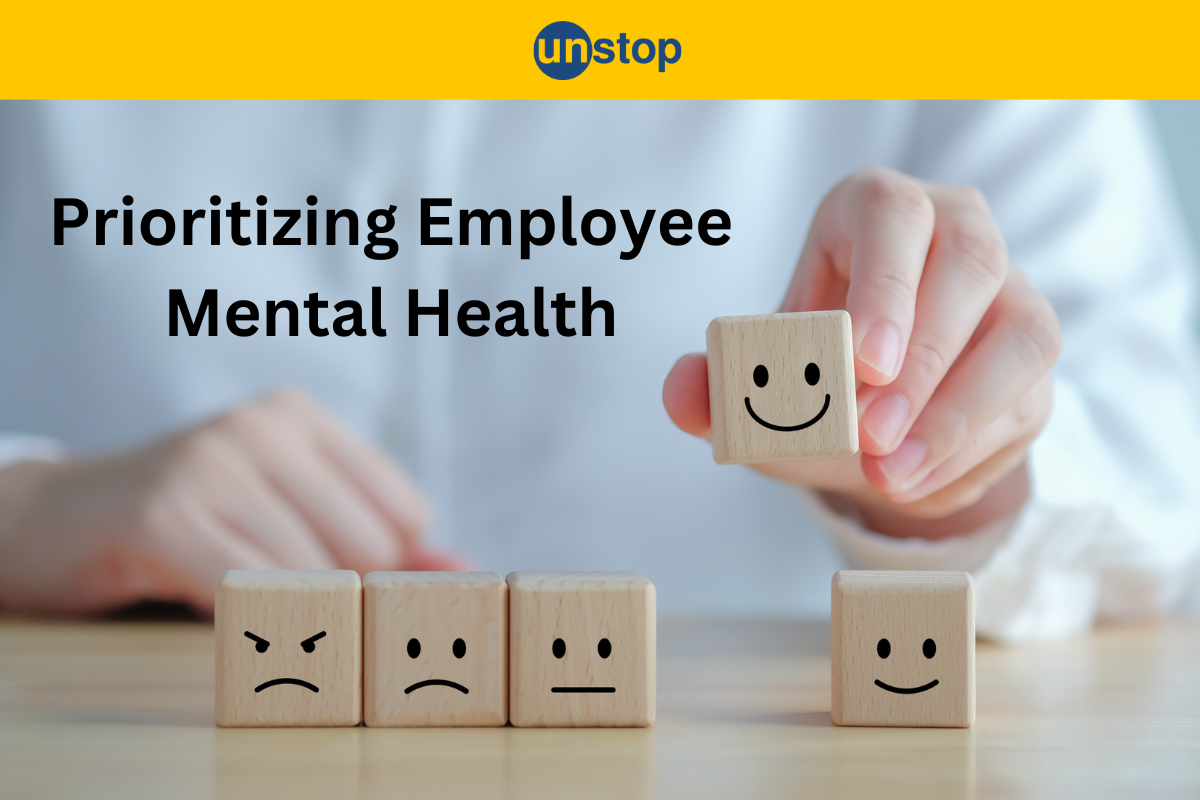
Anil loved his job. However, as the workload increased, so did his stress. Long hours and constant pressure took a toll on his health and productivity. Anil struggled to keep up and eventually reached a breaking point. This story is not uncommon.
In a survey by McKinsey in 15 countries, it was found that about 60% of workers have faced mental health issues at some point in their careers. The percentage is concerning. In today's fast-paced work environment, focusing on the well-being of your team is crucial for overall success. By proactively addressing mental health concerns, companies can foster a more positive and productive workplace culture. This not only boosts employee morale but also reduces absenteeism and turnover rates. Let's take a closer look.
What is Mental Health?
Mental health refers to a person's emotional, psychological, and social well-being. It encompasses how individuals think, feel, and behave, as well as how they cope with the challenges and stresses of life. Mental health is influenced by various factors, including biological, environmental, and genetic factors, as well as life experiences and individual resilience.
Good mental health doesn't just mean the absence of mental health challenges or disorders; rather, it involves the ability to cope with life's ups and downs, maintain a sense of balance, and function effectively in daily activities.
Benefits of a Mentally Healthy Workforce
Promoting mental health in the workplace doesn't only benefit individual employees; it's advantageous for the organization as a whole. Here are some of the key benefits of having a mentally healthy workforce:
-
Increased Productivity: When employees are mentally healthy, they are better able to focus, concentrate, and perform their tasks efficiently. They are less likely to be absent or to experience presenteeism, where they are physically present but not fully engaged due to mental health issues.
-
Improved Morale and Engagement: A positive work environment that prioritizes mental health fosters higher levels of morale and engagement among employees. When individuals feel supported and valued, they are more likely to be motivated to contribute their best efforts.
-
Enhanced Creativity and Innovation: Mental well-being is closely linked to creativity and innovation. Employees who feel mentally well are more likely to think creatively, problem-solve effectively, and come up with innovative ideas that can drive the organization forward.
-
Reduced Turnover: Organizations that prioritize mental health often see lower turnover rates. When employees feel supported in managing their mental health and well-being, they are more likely to stay with the company rather than seeking opportunities elsewhere.
-
Cost Savings: Mental health issues can be costly for organizations in terms of absenteeism, presenteeism, healthcare costs, and turnover expenses. By investing in mental health initiatives and creating a supportive work environment, companies can potentially reduce these costs over the long term.
-
Improved Team Dynamics: A mentally healthy workforce is more likely to have positive team dynamics. Employees are better able to communicate effectively, collaborate, and resolve conflicts constructively, leading to higher levels of teamwork and cohesion.
-
Enhanced Reputation: Companies that prioritize mental health and well-being are often viewed more favourably by employees, customers, and the public. A reputation for caring about the mental health of employees can attract top talent and enhance the organization's brand image.
-
Compliance with Legal and Ethical Obligations: Many jurisdictions have legal and ethical obligations related to workplace mental health. By promoting mental health and providing support for employees, organizations can ensure compliance with relevant laws and regulations while demonstrating a commitment to ethical business practices.
To sum it up, investing in the mental health of employees is not only the right thing to do from a humanitarian perspective, but it also makes good business sense by contributing to a healthier, more productive, and more successful organization.
Prioritizing Mental Health: Creating a Culture of Support
Workload Management
A crucial strategy for managing stress is effective workload management. By assigning tasks appropriately and ensuring a balanced workload, employees are less likely to experience burnout and high levels of stress.
Proper workload management involves regular assessments of tasks and deadlines, ensuring that employees are not overwhelmed with excessive workloads. This approach helps in maintaining a healthy work environment and preventing stressors from affecting employees' mental health.
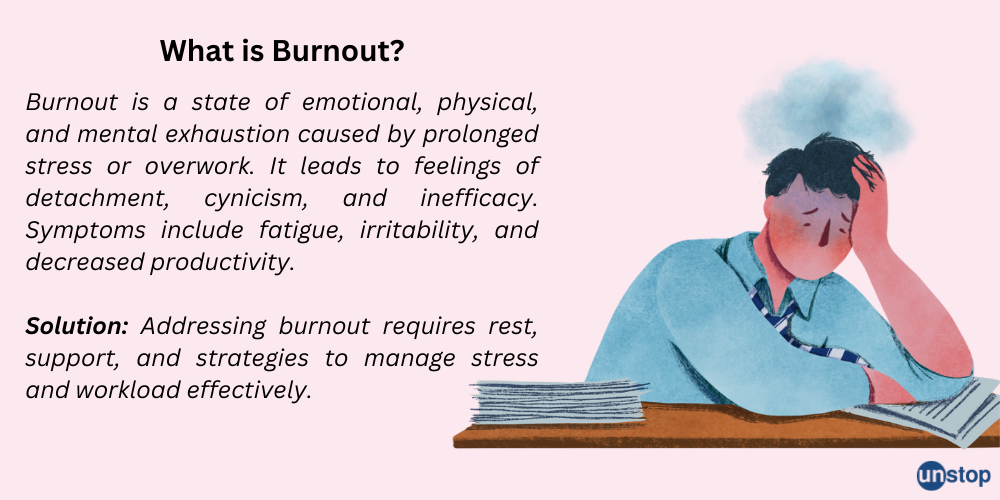
Regular Check-Ins
Regular check-ins play a vital role in monitoring employee well-being and addressing any stressors promptly. These meetings can be conducted on a one-on-one basis or within team settings, depending on organizational preferences.
Paid Time Off Encouragement
Paid time off (PTO) is a crucial aspect of employee benefits, contributing significantly to employee retention. By offering generous PTO packages, companies show their commitment to the well-being of their employees. This leads to higher job satisfaction and loyalty among the workforce.
Employees value leave options that include vacation days, sick leave, and personal days. These benefits enable them to take time off when needed without worrying about losing income. Providing adequate PTO allows employees to recharge, reduce burnout and improve overall mental health.
Mental Health Days
Encouraging the use of mental health days is essential for promoting overall well-being in the workplace. Mental health days allow employees to prioritize their emotional and psychological wellness. It enables them to address stress, anxiety, or other mental health issues proactively.
Offering mental health days as part of the PTO policy shows that the company values mental well-being as much as physical health. Employees who feel supported in taking time off for mental health reasons are more likely to be productive and engaged when they return to work.
Supporting Well-being Initiatives
Employees benefit greatly from comprehensive well-being initiatives. These programs often include mental health resources, counseling services, and workshops on stress management. By offering such benefits, companies show a commitment to their employees' well-being.
Such initiatives can lead to increased job satisfaction, reduced absenteeism, and higher productivity levels. Employees feel valued when organizations prioritize their mental health needs. Access to mental health resources can prevent burnout and improve overall job performance.
Open Communication
Encouraging transparent discussions about workload, challenges, and successes can help alleviate stress and promote a sense of belonging. Providing platforms for feedback and suggestions empowers employees to voice their concerns.
Creating an environment where employees feel comfortable sharing their thoughts and emotions can lead to increased job satisfaction and reduced burnout. Managers should actively listen to their team members' feedback and address issues promptly. As discussed above, implementing regular check-ins or one-on-one meetings can provide opportunities for deeper conversations.
Quick Tip: Incorporating anonymous suggestion boxes or digital feedback tools can also encourage shy or reserved employees to share their thoughts without fear of judgment.
Flexible Work Options
Flexible work options allow employees to maintain a healthy work-life balance by providing the freedom to choose when and where they work. Whether telecommuting, flextime, or compressed workweeks, these options empower employees to structure their work around their personal lives. Another effective way to reduce stressors in the workplace is by implementing flexible hours. Employees can choose their work hours, allowing them to work during their most productive times. This autonomy helps in reducing stress levels significantly.
Flexible work arrangements enable employees to attend medical appointments without sacrificing work hours or manage family responsibilities more effectively. This, thus, promotes a balance between work and personal life of the employee. Ultimately, this flexibility fosters a positive work environment conducive to employee well-being.
Promoting Interpersonal Connections
Building strong engagement within a team is crucial for promoting positive mental health in the workplace. Encouraging team members to collaborate on projects and tasks fosters a sense of unity and support. Organizing team-building activities can strengthen relationships and create a more cohesive work environment.
Encouraging regular interactions among team members outside of work-related tasks can also contribute to engagement. This could include informal gatherings, coffee breaks, or even virtual meetups for remote teams. Creating opportunities for colleagues to get to know each other on a personal level can build stronger connections.
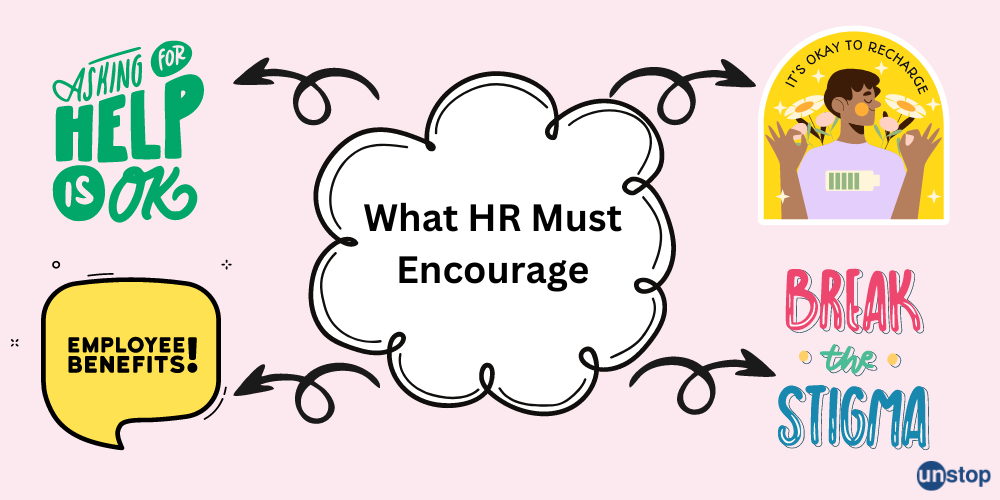
HR Conversations That Can Make A Difference!
HR: Hi! How can I help you today?
Employee: Honestly, I'm feeling a bit overwhelmed lately. Work deadlines are piling up, and I haven't been sleeping well.
HR: I understand. Feeling stressed at work can definitely take a toll on your mental health. Is there anything specific that's causing the most pressure?
Employee: The upcoming deadline for the Abc project is stressing me out. I also feel like I haven't been taking any breaks lately.
HR: Okay, let's see what we can do. First, about the Abc project deadline, have you spoken to your manager about the workload?
Employee: No, not yet. I was worried about seeming incapable.
HR: It's perfectly normal to need help sometimes. Perhaps your manager can delegate some tasks or adjust the deadline a bit.
Employee: That would be great.
HR: Absolutely! Now, about those breaks – have you been taking your lunch breaks and using all your paid time off?
Employee: Uh, not really.
HR: Taking breaks is essential to avoid burnout. It allows you to recharge and come back feeling refreshed. Why not start by scheduling some time in your calendar for a proper lunch break every day?
Employee: That's a good idea. I can definitely do that.
HR: Also, don't forget about your paid time off! It's there for a reason. Even a short break away from work can make a big difference.
Employee: You're right. Maybe I'll plan a long weekend getaway soon.
HR: Sounds like a plan! In addition to these things, our company offers an Employee Assistance Program (EAP) that provides confidential counselling and resources for stress management. Would you be interested in learning more about it?
Employee: Yes, that actually sounds very helpful.
HR: Good! I can send you some information about the EAP. Remember, your well-being is important. Don't hesitate to reach out if you need anything else.
Employee: Thank you so much. I feel much better already.
Final Remarks
Prioritizing employee mental health is not just a moral imperative; it is a strategic necessity for organizations seeking to thrive in today's competitive landscape. By fostering a workplace culture that supports mental well-being, businesses can unlock a multitude of benefits, including increased productivity, improved morale and engagement, enhanced creativity and innovation, reduced turnover, and cost savings. Moreover, promoting mental health aligns with legal and ethical obligations while contributing to a positive reputation and brand image.
As we continue to navigate the complexities of the modern workplace, let us remember that investing in the mental health of employees is an investment in the long-term success and sustainability of the organization. By valuing and prioritizing the well-being of our workforce, we not only create healthier and happier workplaces but also build stronger and more resilient teams poised for success.
We gathered 11,000+ responses from students, colleges and recruiters! Explore the Unstop Talent Report and gain valuable insights into how hiring is evolving and what key stakeholders are feeling about the recruitment landscape.
Frequently Asked Questions
1. How can I prioritize mental health awareness in the workplace?
To prioritize mental health awareness, consider implementing regular training sessions, sharing resources on stress management, and fostering an open dialogue about mental well-being among employees.
2. What are effective stress management strategies for employees?
Encourage mindfulness practices, promote work-life balance, provide access to counseling services, organize stress-relief activities, and ensure realistic workload expectations to help employees manage stress effectively.
3. Why is promoting interpersonal connections important for employee mental health?
Promoting interpersonal connections fosters a sense of belonging and support within the workplace, reducing feelings of isolation and enhancing overall mental well-being among employees.
4. How can offering flexible work hours benefit employee mental health?
Flexible work hours allow employees to better manage their time, reduce commute-related stress, accommodate personal commitments, and create a healthier work-life balance, ultimately improving their mental well-being.
5. Why is it crucial to conduct regular employee check-ins for mental health support?
Regular employee check-ins provide opportunities for open communication, early detection of potential issues, tailored support for individual needs, and a proactive approach to addressing mental health concerns within the workforce.
Suggested Reads:
As a biotechnologist-turned-writer, I love turning complex ideas into meaningful stories that inform and inspire. Outside of writing, I enjoy cooking, reading, and travelling, each giving me fresh perspectives and inspiration for my work.
Login to continue reading
And access exclusive content, personalized recommendations, and career-boosting opportunities.
Subscribe
to our newsletter
Blogs you need to hog!

Organize Hackathons: The Ultimate Playbook With Past Case Studies

What is Campus Recruitment? How To Tap The Untapped Talent?
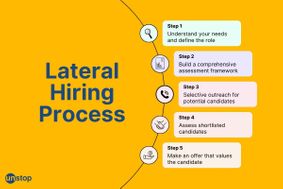
Lateral Hiring: A Complete Guide To The Process, Its Benefits, Challenges & Best Practices
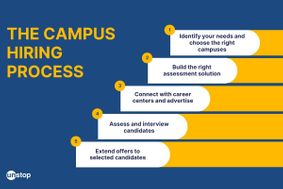










Comments
Add comment